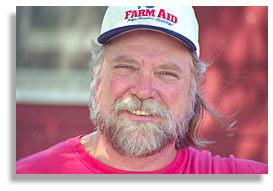|
Not the Estate Tax (or the "death tax" as its opponents call it) Roger Allison Howard County, Missouri
I am a grain and livestock farmer myself, and I have worked with thousands of farmers from all over the state for more than twenty years on farm financing and credit issues. In all these years, I have yet to meet someone who has been impacted by the estate tax. From my experience, this is a non-issue. The Census Bureau reports that only one in 20 farms will ever be wealthy enough to pay the estate tax. With some planning by the farm family, most of that 5% could pass on their farms without paying the tax. Neil Harl, an Iowa State University estate tax expert, said that in 35 years of conducting estate tax seminars for farmers he has "been unable to find a single case where estate taxes caused the sale of a family farm; it's a myth." Harl studied 1998, where 642 of the 47,483 taxable estates that year included farm real estate that amounted to at least one-half of the gross estate value, a whopping 1.35% of estate tax payers. On April 8th, David Cay Johnston of the New York Times reported that the pro-repeal Farm Bureau was unable to show him one example of a farm sold because of the estate tax. Estate tax repeal advocates will go to great lengths to use the family farmer as their symbol in this fight. Last August, repeal advocates had Montana rancher Lynn Cornwell deliver Congress’s year 2000 estate tax repeal bill to President Clinton on a tractor. President Clinton vetoed repeal, indicating that it would primarily enrich the heirs with estates in excess of $5 million. "Half the benefit of that bill that came here on a tractor goes to 3,000 people," quipped President Clinton. "And I'll bet you not a single one of them ever drove a tractor." Why is big business trying to associate farmers with the "death tax?" It’s simple. This is just another example of the corporate agribusiness agenda trying to hide behind the interests of independent producers. The real pressures facing farmers in Missouri and all across the country are the monopolistic corporate stranglehold over the marketplace, farm policies that facilitate that takeover, and low prices that underwrite the profits of grain purchasers like Cargill, ConAgra, and ADM. If members of Congress really intended to help family farmers, they would enact a new farm bill that would ensure farmers a fair price from the market place for the food that we grow. When the problem is farm income and corporate concentration, the estate tax isn’t even on the radar screen of farm policy fixes that family farmers are fighting for. President Bush and his Secretary of Agriculture, Ann Veneman, say what farmers need is a repeal of the death tax and more free trade agreements. Isn’t it ironic that Secretary Veneman’s first administrative act was to reinstate a pork tax that the nation’s hog farmers voted out in a national referendum. The pork checkoff is a failed and unpopular tax that hog farmers voted out 53% to 47% nationally with 64% of Missouri farmers favoring termination. It’s no surprise that the Bush Administration and Congress are holding family farmers hostage in their all or nothing bid for a tax break for the rich. While their rhetoric is wrapped in the flag and the farm belt, their actions prove otherwise. If they really cared about rural communities and independent family farmers, they would take immediate action to restore democracy and terminate the pork checkoff tax. They would write a new farm bill that enables farmers to receive a fair price for their production in the market place without gouging the taxpayer. They would stop corporate concentration and keep markets open and competitive. They would stop driving farmers off the land and closing down rural businesses just to provide cheap grain and livestock for agribusiness. Estate tax repeal is a simple issue. It’s about a massive transfer of wealth to the handful of billionaires that need “tax relief” the least. It’s about tax cuts for private corporations like Cargill and Tyson, not family farmers. It’s about corporate greed. It’s about the rich getting richer while working people and family farmers pay the price. Roger Allison is a livestock and grain farmer from Howard County, Missouri. He is also Executive Director of the Missouri Rural Crisis Center, a farm and rural organization with more than 5500 member families from all over the state. |
|||||||||||||||
| Published in In Motion Magazine, June 1, 2001 |
|||||||||||||||
If you have any thoughts on this or would like to contribute to an ongoing discussion in the  What is New? || Affirmative Action || Art Changes || Autonomy: Chiapas - California || Community Images || Education Rights || E-mail, Opinions and Discussion || En español || Essays from Ireland || Global Eyes || Healthcare || Human Rights/Civil Rights || Piri Thomas || Photo of the Week || QA: Interviews || Region || Rural America || Search || Donate || To be notified of new articles || Survey || In Motion Magazine's Store || In Motion Magazine Staff || In Unity Book of Photos || Links Around The World || OneWorld / US || NPC Productions Copyright © 1995-2011 NPC Productions as a compilation. All Rights Reserved. |
|||||||||||||||


